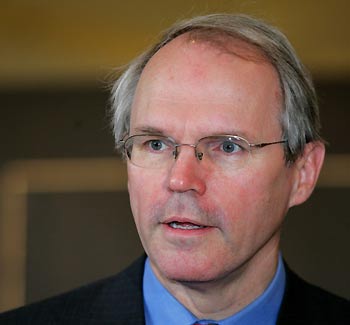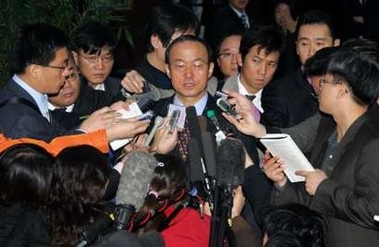|
US rejects North Korea's disarmament idea
(AFP)
Updated: 2005-11-10 09:36
The United States brushed aside North Korea's fresh proposal to abandon its
nuclear arms as six-nation disarmament talks resumed in Beijing with sharp
differences remaining between the two.
Chief US delegate Christopher Hill said North Korea put forward unspecified
steps to rid itself of nuclear weapons and nuclear programs in exchange for
energy aid, security guarantees and other benefits.

Chief U.S. negotiator Christopher Hill speaks
to journalists before attending six-party nuclear talks in Beijing
November 10, 2005. New talks to end North Korea's nuclear programme appear
to have made modest progress but, going into their second day on Thursday,
Washington and Pyongyang remained at odds over the timing and order of
denuclearisation.[Reuters] | "I think that the DPRK (North Korea) needs to understand that we need to move
swiftly on denuclearization and the fact that denuclearization is the first step
in the agreement," Hill told reporters.
The two Koreas, the United States, China, Russia and Japan convened the fifth
round of the talks following their September 19 agreement on principles in the
disarmament-for-benefits deal.
Progress in the 27-month-old talks has stalled over sharp differences about
who does what first.
"I think the DPRK has a much more deliberately slower process of how to
handle denuclearization," Hill added after having a one-on-one dinner with his
North Korean counterpart Kim Gye-Gwan that followed a flurry of plenary and
bilateral contacts on the first day of the new six-nation round.

Song Min-soon, South Korea's Deputy Foreign
Minister and top negotiator for the six-party talks, speaks to journalists
on his way to nuclear talks from his hotel in Beijing November 10,
2005.[Reuters] | North Korea insisted it was ready
to give up its nuclear programs and weapons in phases on condition it was
provided with a light-water reactor, Japan's Kyodo news agency reported quoting
a negotiation source.
"They (North Korea) introduced some elements that are not in the agreed
principles" and that "we are not able to work with," Hill said. "On the other
hand, they showed a willingness to move forward to figure out how to implement
principles."
|